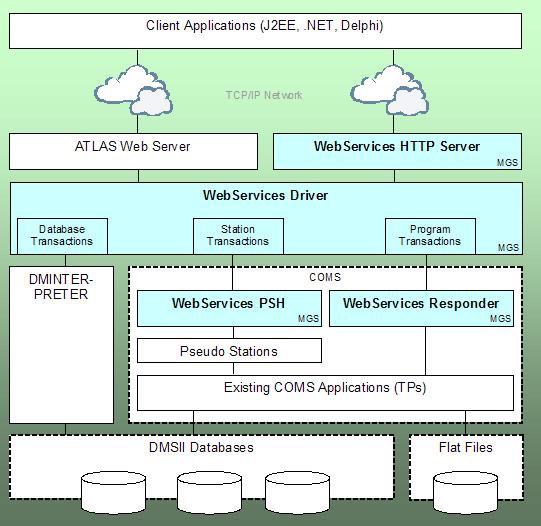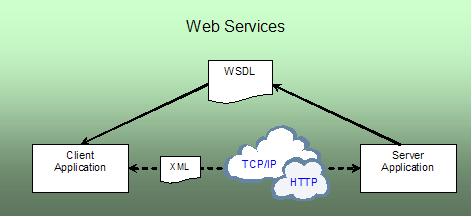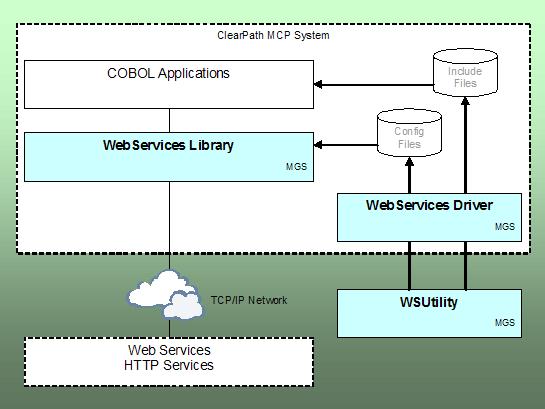


Products: MCP Web Services Software (MGSWEB)
Station transactions use a COMS Protocol Specific Handler (PSH) station to submit the transaction to a COMS application.
The incoming web services requests are reformatted from XML (so they appear to have come from a station) and transmitted to COMS via a PSH station. The PSH station responses are then "screen-scraped" and converted into XML web service responses.
A web services client application can allocate a specific PSH station for its exclusive use for multiple transactions, or it can use any available station for each transaction (for stateless transactions).
Most COMS applications can be accessed via MGSWeb's Station transactions without any modifications.
Program transactions use a special COMS program (included with the MGSWeb software) to do TP-to-TP messages.
The incoming requests are converted from XML into flat records with fixed-size fields (COBOL "01"s) and sent to a COMS application. The application's response is then converted into an XML web service response.
The COMS application must be specially coded to handle the TP-to-TP messages, but this method is more efficient than the Station transaction path.
Database transactions use the DMSII interpretive interface to retrieve records from a DMSII database.
The incoming requests are converted from XML to an interpretive interface "condition", used to execute a FIND against the database. The resulting record is then converted into an XML web services response.
What about security?
MGSWeb can be configured to support SSL encryption for any/all in-bound web services calls to the MCP environment. By utilizing the SSL facility of the Unisys MCP, incoming MGSWeb web services calls can be done over a secure connection, thus protecting your valuable corporate information.
MCP Applications can also be Web Services Clients
The MGSWeb software also includes the ability to call a web service from applications running on the MCP system. These applications can be written in ALGOL, COBOL or any language that supports MCP library calls.
The incoming web services requests are reformatted from XML (so they appear to have come from a station) and transmitted to COMS via a PSH station. The PSH station responses are then "screen-scraped" and converted into XML web service responses.
A web services client application can allocate a specific PSH station for its exclusive use for multiple transactions, or it can use any available station for each transaction (for stateless transactions).
Most COMS applications can be accessed via MGSWeb's Station transactions without any modifications.
Program transactions use a special COMS program (included with the MGSWeb software) to do TP-to-TP messages.
The incoming requests are converted from XML into flat records with fixed-size fields (COBOL "01"s) and sent to a COMS application. The application's response is then converted into an XML web service response.
The COMS application must be specially coded to handle the TP-to-TP messages, but this method is more efficient than the Station transaction path.
Database transactions use the DMSII interpretive interface to retrieve records from a DMSII database.
The incoming requests are converted from XML to an interpretive interface "condition", used to execute a FIND against the database. The resulting record is then converted into an XML web services response.
What about security?
MGSWeb can be configured to support SSL encryption for any/all in-bound web services calls to the MCP environment. By utilizing the SSL facility of the Unisys MCP, incoming MGSWeb web services calls can be done over a secure connection, thus protecting your valuable corporate information.
MCP Applications can also be Web Services Clients
The MGSWeb software also includes the ability to call a web service from applications running on the MCP system. These applications can be written in ALGOL, COBOL or any language that supports MCP library calls.

The ability to utilize web services quickly and easily is built-in to almost all major development tools sold today, including J2EE, .NET, and Delphi. The development environments import a Web Services Definition Language (WSDL) file that describe exactly how to call each available web service and the format of the request and response parameters, so accessing web service transactions is very simple and intuitive.
Using MGSWeb makes accessing your ClearPath MCP data from outside your MCP systems simple. The only required steps in setting MGSWeb up on your host is copying the files to disk and starting the web services WFL. There's no Windows server configuration or installation steps, because there's no third tier servers required. And the Web Services Utility (WSUtility) program generates the WSDL and host configuration files for the COMS transaction web services you define with just a click of a button!
MCP System can Serve Up Web Services
The MGSWeb software allows an MCP system to act as a web services server. It provides direct access to COMS transactions and DMSII databases using web services, without using a middle tier system.
Web services use eXensible Markup Language (XML) and the Simple Object Access Protocol (SOAP) to encode requests and responses, and use the HyperText Transport Protocol (HTTP) to deliver the request/response data. Web services on the ClearPath MCP system can use either Unisys' Web Transaction Server (ATLAS) or MGS' Web Services server as its HTTP server.
The conversion of the incoming requests and the generation of the responses are all controlled by host configuration files, which are generated by the Web Services Utility (WSUtility) on a Windows PC and transferred to the host.
The WSUtility program also generates Web Services Definition Language (WSDL) files that describe the COMS or Database web services. The WSDL files can be imported by programming environments (such as Visual Studio .NET or Delphi), so access to the web service transactions is very simple.
MGSWeb currently supports three types of transactions: Station, Program, and Database.
Using MGSWeb makes accessing your ClearPath MCP data from outside your MCP systems simple. The only required steps in setting MGSWeb up on your host is copying the files to disk and starting the web services WFL. There's no Windows server configuration or installation steps, because there's no third tier servers required. And the Web Services Utility (WSUtility) program generates the WSDL and host configuration files for the COMS transaction web services you define with just a click of a button!
MCP System can Serve Up Web Services
The MGSWeb software allows an MCP system to act as a web services server. It provides direct access to COMS transactions and DMSII databases using web services, without using a middle tier system.
Web services use eXensible Markup Language (XML) and the Simple Object Access Protocol (SOAP) to encode requests and responses, and use the HyperText Transport Protocol (HTTP) to deliver the request/response data. Web services on the ClearPath MCP system can use either Unisys' Web Transaction Server (ATLAS) or MGS' Web Services server as its HTTP server.
The conversion of the incoming requests and the generation of the responses are all controlled by host configuration files, which are generated by the Web Services Utility (WSUtility) on a Windows PC and transferred to the host.
The WSUtility program also generates Web Services Definition Language (WSDL) files that describe the COMS or Database web services. The WSDL files can be imported by programming environments (such as Visual Studio .NET or Delphi), so access to the web service transactions is very simple.
MGSWeb currently supports three types of transactions: Station, Program, and Database.

MGSWeb supports two types of outbound web service types: WSDL-based web services (which are called a "Web Service"), and non-WSDL-based web services (which are called an "HTTP Service").
Enabling an application on the ClearPath MCP system to call a WSDL-based web service requires the following steps using the WSUtility program:
What about security for my client Web Services calls?
MGSWeb also provides an option were an out-bound Web Services or HTTP Service call can be done across an SSL connection. This facility is fully integrated into the MGSWeb product so no special application code is needed. When defining an out-bound service call with WSUtility, simply specify that it will be done using SSL communication.
Request Trial Software - Click here to request a information on acquiring a trial copy of the MGSWeb software.
Download Reference Manual - Click here to download a PDF copy of the MGSWeb reference manual.
Download 3.10 Software - Click here to download the MGSWeb 3.10 release. Userid/Password required!
Enabling an application on the ClearPath MCP system to call a WSDL-based web service requires the following steps using the WSUtility program:
- Create a new Web Service project.
- Load the web service's WSDL file.
- Make any changes to the request/response record descriptions.
- Generate the host configuration file.
- Optionally, generate a COBOL "COPY" file for the web service.
- Create a new HTTP Service project.
- Define the request and response records for each operation.
- Generate the host configuration file.
- Optionally, generate a COBOL "COPY" file for the web service.
What about security for my client Web Services calls?
MGSWeb also provides an option were an out-bound Web Services or HTTP Service call can be done across an SSL connection. This facility is fully integrated into the MGSWeb product so no special application code is needed. When defining an out-bound service call with WSUtility, simply specify that it will be done using SSL communication.
Request Trial Software - Click here to request a information on acquiring a trial copy of the MGSWeb software.
Download Reference Manual - Click here to download a PDF copy of the MGSWeb reference manual.
Download 3.10 Software - Click here to download the MGSWeb 3.10 release. Userid/Password required!
MGS, Inc. MCP Web Services (MGSWeb) is a set of software components, running on the MCP platform that implements two capabilities. First, it allows you to have your MCP system serve up web services on your Intranet or the Internet. The web services can be based on either existing COMS transactions or on data from your DMSII databases. Second, it allows existing MCP applications to call web services that are available on other computers connected to your Intranet or the Internet.
What are Web Services? Essentially, web services implements the ability to call functions on a remote system (Remote Procedure Call, or RPC) over the same communication channel used by web browsers, using a simple, text-based protocol.
What are Web Services? Essentially, web services implements the ability to call functions on a remote system (Remote Procedure Call, or RPC) over the same communication channel used by web browsers, using a simple, text-based protocol.





